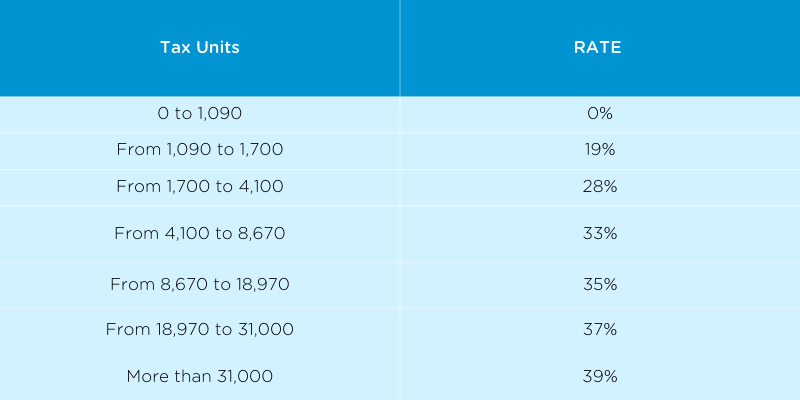
By
Leanna Seah
September 20, 2024
Updated
October 29, 2024

Overview
Colombia, located in northwestern South America, is a dynamic country brimming with potential for businesses seeking to hire exceptional talent and expand their operations. With a population of approximately 50 million people, Colombia boasts a well-educated workforce ready to contribute their skills and expertise.
The country's economy, with a Gross Domestic Product (GDP) of $314,5 billion as of 2021, offers a range of thriving industries such as manufacturing, technology, tourism, agriculture, mining and oil. The fourth-largest economy in Latin America also has a Human Development Index (HDI) of 0.767 (97th in the world) and a literacy rate of 99.12%.
Its rich cultural heritage, diverse landscapes, and warm hospitality make Colombia an enticing destination for both local and international professionals. By tapping into Colombia's abundant resources, businesses can seize numerous opportunities to attract top talent and foster growth within their organisations.
| Capital | Bogota |
| Languages spoken | Spanish |
| Population size | 51,5 million |
| Payroll frequency | Monthly or Bi-Monthly |
| Currency | Colombian Peso (COP) |
| VAT | General VAT: 19% |
Payroll and taxes
Colombia is a good destination for businesses looking to expand internationally, especially in South America. The growing economy and developing social indicators are good for inviting new organisations to set up shop in the country.
Employer contributions
Employer payroll contributions consists of these main different taxes:
- 12% - Pension Fund
- 8.5% - Medical Plan
- 4% - Family Compensation Fund
- 3% - Family Welfare (ICBF)
- 0.5% - 6.96% - Labour Risk Tax
- 2% - National Apprentice (SENA)
Employee contributions
Employee payroll contributions consists of these main different taxes:
- 4% to 8% - Pension Fund
- 4% - Medical Plan
All workers are subject to these contributions in Colombia. Employees that earn more than 4 times the minimum wage amount must contribute another 1% to the Pension Fund.
Income tax
Workers are subject to income tax in Colombia. Refer to the table below for a breakdown of the tax contribution rate according to income bracket:

It’s important to note that the rates in Colombia are defined not by the actual currency of Colombian Pesos (COP), but with Tax Units. Every Tax Unit corresponds to 42,412 COP which is roughly 8,77 USD.
Minimum wage
In Colombia, the minimum wage is set at COP1,300,606.00 per month in 2023. That’s equivalent to 288 USD monthly. With the minimum wage, there’s also an obligatory transportation allowance of COP140,606.
Working hours
In accordance with Colombian labour laws, the maximum duration of working hours is currently set at 8-10 hours per day and 48 hours per week. It is important to respect the non-working time of employees, and employers should refrain from contacting them outside of their designated working hours.
Starting from the summer of 2023, there will be a gradual reduction in the 48-hour work week. Each year, Colombians will work one hour less per week, without any negative impact on their salary, benefits, or the value of the daily working hour.
The ultimate goal of this measure is to reduce the workday to 42 hours per week by the year 2026. The reduction will commence with a one-hour decrease in the first two years (2023 and 2024), followed by an additional two-hour reduction in the subsequent years (2025 and 2026).
Overtime
Any work performed beyond the standard weekly working hours is considered overtime and is subject to regulation by the employment contract or collective agreements. For employees working between the hours of 22h and 06h , they are entitled to receive 35% more than their equivalent daytime salary.
There are exemptions for the receipt of overtime pay, which include employees who earn more than 10 times the minimum wage or those in trust positions. For the remaining employees, the payment of overtime is generally calculated as follows:
- Daytime overtime is compensated at 125.00% of the regular pay rate.
- Night-time overtime hours receive a higher rate of 175.00% of the standard pay rate.
When it comes to Sunday, extra daytime, and holiday overtime work, the payment structure is as follows:
- Overtime work during the daytime is compensated at 125% of the regular pay rate.
- For holidays and night-time work, the overtime rate is 175% of the regular pay rate.
Employee benefits
13th (or bonus) salary
Similar to many Latin American nations, Colombia has a legal requirement for a bonus equivalent to one month's salary. However, this bonus is specifically applicable to employees under an ordinary salary scheme.
Unlike some countries where it is referred to as a 13th-month or end-of-year bonus, in Colombia, this bonus is distributed in two instalments throughout the year. Employees receive half of the bonus in June and the remaining half in December.
While employers have the freedom to grant additional bonuses to their employees, any bonuses tied to performance are considered as part of their regular salary. This means that performance-related bonuses are not separate from the overall salary structure in Colombia.
 Source: Shutterstock
Source: ShutterstockTypes of leave available
Paid time off
In Colombia, paid leave is legally stipulated in the employment contract, guaranteeing a minimum of 15 days of paid leave per year. Employees become eligible for this paid leave benefit after completing one year of continuous service with their employer. It is important to note that this entitlement is separate from any public holidays that employees may also be entitled to.
Sick leave
In Colombia, employees have the right to paid sick leave provided by their employer for the first two days of absence, during which they are entitled to receive 100% of their regular pay rate. To be eligible for payment, employees must obtain medical authorization from a Colombian social security entity.
Starting from the third day of sick leave onwards, the responsibility for payment shifts to the social security system at a rate of 66.67%. However, according to the law, the employer is still required to pay the employee from the third day until the 180th day of absence, with reimbursement from the social security system. These same rules apply to disability leave, ensuring that employees are supported during their period of illness or disability.
Maternity leave
In Colombia, employees have the right to 18 weeks of paid maternity leave, during which they are entitled to receive 100% of their regular salary rate of pay. The employer is responsible for providing this payment to the employee and is subsequently fully reimbursed by the social security system. This ensures that employees can take the necessary time off for maternity purposes without experiencing any financial burden.
Paternity leave
In Colombia, employees have the right to eight business days of paid paternity leave, during which they are entitled to receive 100% of their regular salary rate of pay. The employer is responsible for providing this payment to the employee and is subsequently fully reimbursed by the social security system, specifically the EPS (Entidad Promotora de Salud).
This arrangement ensures that employees can take time off to bond with their newborn child or support their partner without experiencing any financial burden.
Other leaves
In Colombia, employees have specific entitlements for leave related to certain life events. In the unfortunate event of the death of an immediate family member, an employee is entitled to up to five days of leave. This allows employees the necessary time to grieve, attend funeral arrangements, and take care of family matters.
Additionally, employees are entitled to five days of leave in the event of their marriage. This provision enables employees to celebrate and prepare for their wedding ceremony without the need to use their regular vacation or paid leave days.
These leave benefits acknowledge the importance of personal and family events, allowing employees to manage their personal responsibilities and maintain a healthy work-life balance.
Public holidays
Colombia observes a total of 18 public holidays throughout the year. It is important to note that if a public holiday does not fall on a Monday, it will be moved to the following Monday as mandated by the law.
This ensures that employees can enjoy an extended weekend and have an opportunity to rest and celebrate these important occasions.
- New Year’s Day - January 1
- Epiphany - January 9
- St Joseph’s Day - March 20
- Maundy Thursday - Thursday before
- Easter
- Good Friday - Friday before Easter
- Easter
- Labor Day - May 1
- Ascension Day - May 22
- Corpus Christi - June 12
- Sacred Heart - June 19
- Assumption Day - August 21
- Columbus Day - October 16
- All Saints’ Day - November 6
- Independence of Cartagena - November 13
- Immaculate Conception - December 8
- Christmas Day - December 25
Attracting talent
The Colombian job market is characterised by fierce competition, necessitating strategic measures for companies to attract and retain top-tier talent. Similar to other markets, this has given rise to a "talent war" where organisations must differentiate themselves from their rivals. While offering competitive salaries is important, it is not the sole factor in attracting and retaining the best candidates.
Creating value in job positions is paramount for companies seeking to retain exceptional talent since employees desire work that is meaningful and has a positive impact. Firms that focus solely on compensation and benefits will encounter challenges in attracting and retaining top talent, as many individuals seek a sense of purpose and fulfilment in their professional endeavours.
By emphasising job value, companies can foster a sense of ownership, autonomy, and mastery among employees, leading to increased job satisfaction and engagement.
Leadership can also play a major part in this situation, crafting better and more engaging roles, while being important in leading the teams to success.
Invest in employer brand
In the competitive Colombian job market, where compensation packages often resemble one another.Therefore, reinforcing company culture is crucial for distinguishing an organisation from its competitors and building an attractive employer brand.
Today's workforce places significant emphasis on values, beliefs, behaviours, and practices that shape the work environment. Candidates are increasingly drawn to companies that align with their personal values and offer a positive workplace atmosphere that fosters growth and well-being.
To go along with that, business can do the following:
- Foster open lines of communication
- Set clear goals
- Prioritise career development
- Enhance the candidate experience
- Leverage employee referral programs
Allowing employees to be flexible
In recent years, flexible work has emerged as a game-changer in talent attraction and employee satisfaction. Companies in Colombia are witnessing the transformative power of granting individuals autonomy over their working hours and location. And it impacts productivity as well.
A Gartner survey revealed that 43% of the workforce feel more productive when they can shape their own time at work. This newfound freedom allows employees to orchestrate their professional and personal lives in a harmonious manner, redefining their perception of work-life balance.
Forward-thinking organisations that prioritise flexible work arrangements are gaining a competitive edge in attracting and retaining top-tier Colombian talent. By recognising and catering to the growing desire for flexibility, these companies are not only meeting the evolving needs of their workforce but also fostering a culture of trust, empowerment, and work-life integration.
The ability to align work commitments with personal responsibilities creates a sense of fulfilment and well-being, ultimately resulting in enhanced job satisfaction and loyalty among employees.
Making competitive remuneration and benefits packages
To attract highly qualified candidates, companies need to offer compensation packages that align with the local market and cater to the needs and preferences of prospective employees.
This entails providing competitive salaries and benefits, including health insurance coverage and housing allowances that are in line with industry standards. In addition to traditional benefits, Colombian companies can set themselves apart by offering unique and appealing perks. For instance, they may provide additional paid time off for personal or professional development activities, allowing employees to enhance their skills and knowledge.
By crafting comprehensive packages that address the specific needs and preferences of potential employees, companies can position themselves as desirable employers and successfully attract top-tier talent in Colombia.
 Source: Shutterstock
Source: Shutterstock
Termination of employment
In Colombia, the termination process follows standard procedures in accordance with labour law requirements, unless there is sufficient cause for immediate dismissal without notice, such as misconduct or other valid reasons.
When terminating an employee, the notice of termination must be provided in writing and submitted to the relevant governmental authorities as per legal obligations. This ensures proper documentation and compliance with regulatory procedures.
Furthermore, it is the employer's responsibility to make the necessary payment to the departing employee on their last day of work. This includes any outstanding wages, benefits, or entitlements that the employee is owed. By adhering to these practices, employers in Colombia can ensure a smooth and compliant termination process, promoting fairness and transparency in employment relationships.
Notice period
In Colombia, the notice period for termination varies depending on the length of an employee's service. For the first five years of employment, a notice period of 30 days is required. However, for employees with longer service, the maximum notice period can extend up to 90 days.
For contracts classified as obra/labour (specific work) or indefinite contracts, there is no mandatory notice period required by law. However, it is common practice to provide a notice period of 15 days in these cases. During the probationary period, which is typically the initial stage of employment, a notice period of 15 days is required for termination.
These notice periods ensure that both employers and employees have sufficient time to prepare for the end of the employment relationship and allow for a smooth transition for all parties involved.
Probation period
In Colombia, the probation period is optional for employers. However, it is recommended to establish a probation period that is typically set at 1/5 of the total contract duration or up to a maximum of 2 months.
For permanent employees, a probation period of two months is commonly implemented. This period allows both the employer and employee to assess job performance, suitability, and alignment with the organisation's requirements and expectations.
Severance
In Colombia, the payment of severance is mandatory and determined based on the employee's length of service and rate of earnings. For employees who earn less than 10 times the minimum monthly wage, the severance payment entitlement is 30 days for the first year of employment, with an additional 20 days for each additional year of service.
For employees who earn more than 10 times the minimum monthly wage, the severance payment entitlement is 20 days for the first year of employment, with an additional 15 days for each additional year of service. These severance payments serve as financial compensation for employees upon the termination of their employment and are calculated based on their earnings and length of service. It ensures that employees receive fair compensation for their contributions to the organisation over time.
What are my options for hiring?
If you have plans to expand your business to Colombia, Airswift is here to provide comprehensive support in ensuring compliance with local government regulations. We offer expert guidance in areas such as employment regulations, legal advice, labour laws, tax requirements, workplace safety, permits, and other related matters.
Our aim is to safeguard your business from unnecessary risks, allowing you to prioritise your company's needs, growth prospects, and international expansion.
With our extensive knowledge and experience in the Colombian market, we are well-equipped to assist your organisation with HR-related challenges in a cost-effective and compliant manner.
Talent acquisition
Our local talent acquisition consultants can work with your company to identify the ideal candidates that align with your company culture. We also have a comprehensive database of highly qualified contractors for flexible employment options.
Whether you require support for temporary project staffing or permanent recruitment, we offer tailored solutions to swiftly and efficiently identify the finest candidates.
Our team of local talent acquisition consultants will collaborate closely with your company to pinpoint the perfect candidates who align seamlessly with your organisational culture.
Employer of record
If you're looking to hire Colombian workers without establishing a local entity, Airswift can provide valuable assistance as an Employer of Record (EoR). As an EoR, we offer a solution that enables you to find and recruit the right individuals for your company, all without the necessity of a physical office presence.
By partnering with Airswift as a third-party EOR, you can concentrate on managing your business operations while we handle crucial administrative tasks such as payroll, tax management, employee benefits, and onboarding.
Our EOR services ensure compliance with local laws and regulations, eliminating the need for a dedicated HR department and allowing you to streamline your hiring process efficiently.
*Although the information provided has been produced from sources believed to be reliable, no warranty, express or implied, is made regarding the accuracy, adequacy, completeness, legality or reliability of any information. For the latest information and specific queries regarding particular cases, please contact our team.


